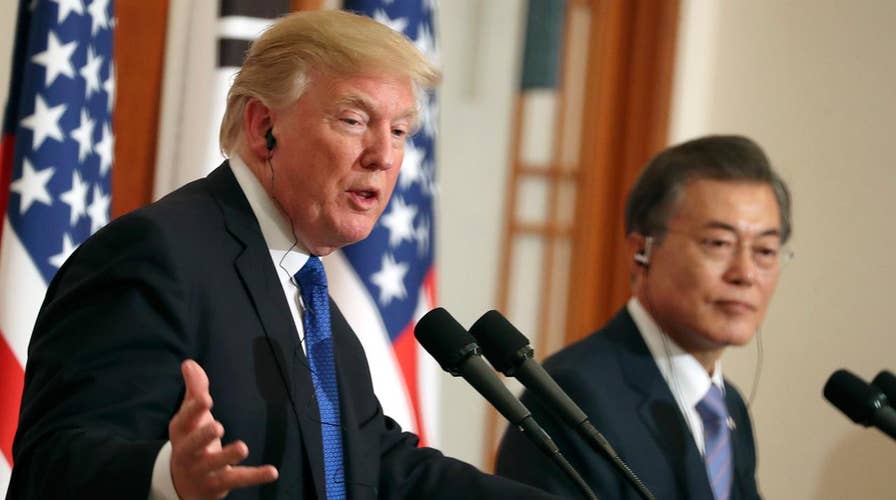Trump projects message of unity in South Korea
President discusses North Korea threat during state visit; Amy Kellogg reports from Seoul.
Who most worries South Korea’s President Moon Jae In? Is it North Korea’s Kim Jong Un, the brutal dictator who has vowed to oust U.S. forces from the Korean peninsula and reunify north and south under his authoritarian leadership, or America’s democratically elected, Twitter-happy president Donald J. Trump? That is not an easy question to answer.
President Trump is in Seoul, the second stop on his five-nation, 11-day Asian tour and the mutual compliments were flowing. But while South Koreans enjoy a prosperous democracy with strong economic growth, an unfettered press and vibrant political debate, many Koreans are reluctant to distress visitors by telling us things we might prefer not to hear or consider insulting.
Diplomatic niceties notwithstanding, President Moon’s advisers at the presidential “Blue House” in Seoul left little doubt during my visit two weeks ago about whom they regard as the tougher customer to handle.
Their angst was directed at President Trump. “Is he crazy enough to attempt a pre-emptive strike?” one adviser to President Moon asked me during my week-long stay in the Korean capital. “Kim Jung Un is not irrational,” the adviser asserted. But could President Trump’s brash rhetoric and inexperience in foreign affairs “provoke an accidental, unintended conflict?”
The left-leaning President Moon finds himself in a tough diplomatic spot. Although the South Korean-U.S. alliance forged in 1953 in the aftermath of the Korean War has long been the pillar of South Korea’s security and a guarantee against North Korean aggression, Moon took office this year promising to revive a long-stalled dialogue with North Korea and “say no to the Americans if necessary.” But given Kim Jung Un’s lack of response to his overtures, President Moon has had little choice but to stand with President Trump, despite concerns that his bellicose rhetoric could drag Korea into a war that it neither chooses nor desires.
Although his approval ratings remain high, Moon’s reluctant embrace of Mr. Trump’s “maximum pressure” policy towards Pyongyang has alienated part of his own political base and left him vulnerable to charges of selling out to Washington.
Still, in a nationally televised speech last week, Moon did not offer to meet with his North Korean counterpart, a staple of his earlier speeches. While he strongly opposed military action in response to North Korea’s ongoing nuclear program, he endorsed the largest annual increase in South Korea’s military budget in nearly a decade and vowed to maintain his country’s “overwhelming military superiority.” Specifically, his annual budget, which legislators must approve, calls for almost a 7 percent increase in defense spending and a 10.5 percent increase in funds for projects aimed at “enhancing defense capabilities.”
Increasingly boxed in not only by Kim Jung Un’s unwillingness to engage and President Trump’s demands for greater support for a tougher stance towards North Korea and more trade concessions from his country, Moon has reached out to China.
Last Tuesday, he and China reached agreement to end their dispute over Beijing’s opposition to Seoul’s deployment of the U.S. defense system known as Terminal High Altitude Area Defense, or THAAD.
To prevent Seoul from expanding the system, China has punished South Korean businesses, particularly those in the tourism, cosmetics and entertainment sectors. Although China did not specifically link its boycott of such companies to THAAD deployment, Beijing has made its opposition to the system clear.
As part of its renewed outreach, President Moon is scheduled to meet Chinese President Xi Jinping at a separate meeting during the Asia-Pacific Economic Cooperation (APEC) summit in Vietnam on Nov. 10th and 11th. Several Korean analysts predicted that Moon would continue to move closer to Beijing as concerns about perceived dysfunction in Washington grows. “President Moon is very pro-Chinese,” said Kim Jin-Hyun, chairman of the World Peace Forum.
South Korean officials said that another item on the agenda of the Moon-Trump talks will be South Korea’s stated desire for greater control of its own military forces in the event of war and an effective veto over American military action against North Korea without Seoul’s consent.
South Korea’s defense minister raised these issues in his recent meeting with U.S. Defense Secretary Jim Mattis, South Korean officials said. Since the 1950’s, Korean forces are supposed to be under U.S. command in the event of conflict. In his speech last week, President Moon said the use of force against Pyongyang "shall not be taken” absent South Korean consent.
As a practical matter, however, there is little that Moon can do in the short run about his junior status in the U.S.-Korean alliance given Kim Jung Un’s continued testing of nuclear weapons and ballistic missiles, his lack of interest in dialogue and the presence of nearly 11,000 conventional artillery pieces aimed at Seoul just north of the demilitarized zone, the infamous DMZ. South Korean officials concede that a conflict with the North might erupt quickly, without much time for consultation. “There is no hotline between Pyongyang and Seoul,” one official acknowledged.
South Korean officials breathed a collective sigh of relief when they learned that President Trump had no plans to visit the DMZ which divides the two Koreas, on his first trip to their country. Though virtually all recent American commanders in chief have made this stop on a presidential visit, U.S. officials said that Mr. Trump would be too busy addressing the National Assembly, South Korea’s legislature, the first U.S. leader to do so in almost 25 years.
Mr. Trump also visited Camp Humphreys at Pyeongtaek Tuesday, south of Seoul, the site to which many of the 28,500 American soldiers stationed in Korea are being relocated, largely at South Korea’s expense.Though he praised Koreans for spending billions on the new base the president quipped that he could have built it for less.

